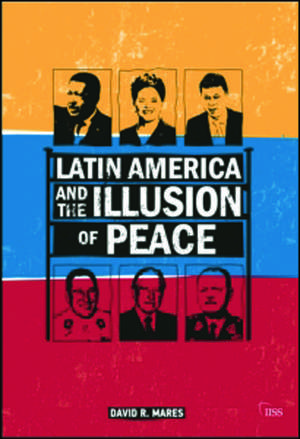Latin America and the Illusion of Peace: Adelphi series
Autor David R. Maresen Limba Engleză Paperback – 7 mai 2012
Din seria Adelphi series
-
 Preț: 199.91 lei
Preț: 199.91 lei -
 Preț: 270.50 lei
Preț: 270.50 lei -
 Preț: 239.46 lei
Preț: 239.46 lei -
 Preț: 183.87 lei
Preț: 183.87 lei -
 Preț: 108.97 lei
Preț: 108.97 lei -
 Preț: 207.85 lei
Preț: 207.85 lei -
 Preț: 109.86 lei
Preț: 109.86 lei -
 Preț: 208.07 lei
Preț: 208.07 lei -
 Preț: 183.74 lei
Preț: 183.74 lei -
 Preț: 183.63 lei
Preț: 183.63 lei -
 Preț: 279.92 lei
Preț: 279.92 lei -
 Preț: 173.96 lei
Preț: 173.96 lei -
 Preț: 131.89 lei
Preț: 131.89 lei -
 Preț: 176.86 lei
Preț: 176.86 lei -
 Preț: 197.68 lei
Preț: 197.68 lei -
 Preț: 221.81 lei
Preț: 221.81 lei - 27%
 Preț: 210.55 lei
Preț: 210.55 lei -
 Preț: 273.21 lei
Preț: 273.21 lei -
 Preț: 299.65 lei
Preț: 299.65 lei -
 Preț: 297.65 lei
Preț: 297.65 lei -
 Preț: 298.80 lei
Preț: 298.80 lei -
 Preț: 307.11 lei
Preț: 307.11 lei -
 Preț: 295.91 lei
Preț: 295.91 lei -
 Preț: 298.39 lei
Preț: 298.39 lei - 26%
 Preț: 229.86 lei
Preț: 229.86 lei -
 Preț: 296.13 lei
Preț: 296.13 lei -
 Preț: 300.50 lei
Preț: 300.50 lei - 20%
 Preț: 131.09 lei
Preț: 131.09 lei -
 Preț: 297.27 lei
Preț: 297.27 lei -
 Preț: 297.11 lei
Preț: 297.11 lei -
 Preț: 296.52 lei
Preț: 296.52 lei -
 Preț: 297.44 lei
Preț: 297.44 lei -
 Preț: 301.31 lei
Preț: 301.31 lei -
 Preț: 295.53 lei
Preț: 295.53 lei - 20%
 Preț: 253.86 lei
Preț: 253.86 lei - 30%
 Preț: 154.79 lei
Preț: 154.79 lei - 31%
 Preț: 141.31 lei
Preț: 141.31 lei - 30%
 Preț: 155.19 lei
Preț: 155.19 lei - 27%
 Preț: 157.00 lei
Preț: 157.00 lei - 28%
 Preț: 166.71 lei
Preț: 166.71 lei -
 Preț: 295.53 lei
Preț: 295.53 lei -
 Preț: 252.88 lei
Preț: 252.88 lei -
 Preț: 297.96 lei
Preț: 297.96 lei - 28%
 Preț: 154.76 lei
Preț: 154.76 lei -
 Preț: 296.68 lei
Preț: 296.68 lei -
 Preț: 272.78 lei
Preț: 272.78 lei -
 Preț: 297.53 lei
Preț: 297.53 lei -
 Preț: 295.75 lei
Preț: 295.75 lei -
 Preț: 311.86 lei
Preț: 311.86 lei -
 Preț: 311.86 lei
Preț: 311.86 lei
Preț: 92.42 lei
Preț vechi: 117.03 lei
-21% Nou
Puncte Express: 139
Preț estimativ în valută:
17.69€ • 19.22$ • 14.87£
17.69€ • 19.22$ • 14.87£
Carte tipărită la comandă
Livrare economică 21 aprilie-05 mai
Preluare comenzi: 021 569.72.76
Specificații
ISBN-13: 9780415638463
ISBN-10: 0415638461
Pagini: 204
Dimensiuni: 156 x 234 x 15 mm
Greutate: 0.39 kg
Ediția:1
Editura: Taylor & Francis
Colecția Routledge
Seria Adelphi series
Locul publicării:Oxford, United Kingdom
ISBN-10: 0415638461
Pagini: 204
Dimensiuni: 156 x 234 x 15 mm
Greutate: 0.39 kg
Ediția:1
Editura: Taylor & Francis
Colecția Routledge
Seria Adelphi series
Locul publicării:Oxford, United Kingdom
Public țintă
Postgraduate and ProfessionalRecenzii
'This highly useful survey of contemporary Latin American security demonstrates how growing sub-national security threats and persistent inter-state disputes combine to make military disputes more likely. Integrating domestic politics and international strategy, it provides a nuanced explanation for when and where states in Latin America resort to force, and what regional states and international organisations can do to diminish the risk of war.’ Harold Trinkunas, Professor, National Security Affairs, Naval Postgraduate College, Monterey, California
‘A thorough and useful contribution to the understanding of contemporary conflicts in Latin America.' Andres Serbin, President, Coordinadora Regional de Investigaciones Economicas y Sociales
‘A thorough and useful contribution to the understanding of contemporary conflicts in Latin America.' Andres Serbin, President, Coordinadora Regional de Investigaciones Economicas y Sociales
Cuprins
Introduction Inter-state conflict in Latin America Latin America’s security architecture Significance of Latin American conflict Chapter One Sources of conflict Inter-state controversies The domestic drivers of foreign policy Chapter Two The dynamics of militarisation Understanding militarisation Political–military strategies Strategic balance Characteristics of force Constituency’s willingness to pay costs Leader’s accountability Chapter Three Latin American hot spots Colombia–Ecuador, with Venezuela contributing to tensions Nicaragua–Costa Rica Bolivia–Chile Dominican Republic–Haiti Argentina–United Kingdom Chapter Four Preserving the illusion: managing conflict in Latin America United States: preoccupied elsewhere Brazil’s paradox: global aspirations limit regional impact The multilaterals: going against the grain Conclusion Appendix One Selected unresolved inter-state disputes in Latin America Appendix Two Memberships Appendix Three Latin America boundary settlements 2000–2011
Descriere
This book explores interstate conflict and its dynamics in the context of Latin America’s contemporary conflict management experience.











